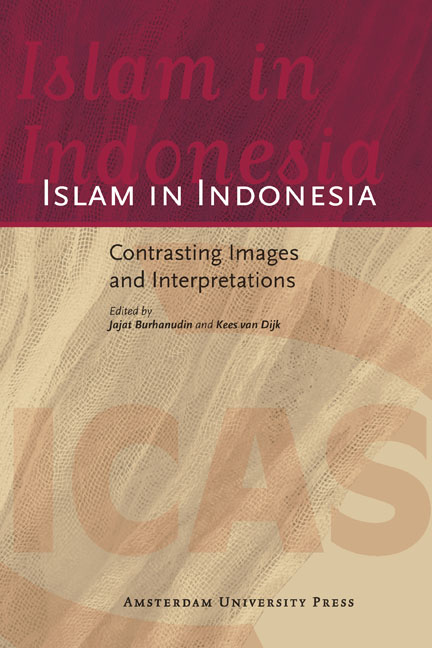Book contents
- Frontmatter
- Contents
- Introduction
- 1 Comparing Different streams of Islam: Wrestling with Words and Definitions
- 2 Defining Indonesian Islam: An Examination of the Construction of the National Islamic Identity of Traditionalist and Modernist Muslims
- 3 Indonesia in the Global Scheme of Islamic Things: Sustaining the Virtuous Circle of Education, Associations and Democracy
- 4 Distinguishing Indonesian Islam: Some Lessons to Learn
- 5 Islam, State and Society in Democratising Indonesia: A Historical Reflection
- 6 The Politics of Piety in the Pondok Pesantren Khusus Waria Al-Fattah Senin-Kamis Yogyakarta: Negotiating the Islamic Religious Embodiment
- 7 The Indonesian Muslim Feminist Reinterpretation of Inheritance
- 8 Managing Familial Issues: Unique Features of Legal Reform in Indonesia
- 9 A new Generation of Feminists within Traditional Islam: An Indonesian Exception
- 10 Religious Pluralism and Contested Religious Authority in Contemporary Indonesian Islam: A. Mustofa Bisri and Emha Ainun Nadjib
- 11 Islam and Humanitarian Affairs: The Middle Class and New Patterns of Social Activism
- 12 Dakwah radio in Surakarta: A Contest for Islamic Identity
- 13 Muslim Fundamentalism in Educational Institutions: A Case Study of Rohani Islam in High Schools in Cirebon
- 14 Majlis Tafsir Al-Qur’an and its Struggle for Islamic Reformism
- Glossary
- About the Editors and Contributors
- Bibliography
- Index
- Monographs
11 - Islam and Humanitarian Affairs: The Middle Class and New Patterns of Social Activism
Published online by Cambridge University Press: 09 January 2021
- Frontmatter
- Contents
- Introduction
- 1 Comparing Different streams of Islam: Wrestling with Words and Definitions
- 2 Defining Indonesian Islam: An Examination of the Construction of the National Islamic Identity of Traditionalist and Modernist Muslims
- 3 Indonesia in the Global Scheme of Islamic Things: Sustaining the Virtuous Circle of Education, Associations and Democracy
- 4 Distinguishing Indonesian Islam: Some Lessons to Learn
- 5 Islam, State and Society in Democratising Indonesia: A Historical Reflection
- 6 The Politics of Piety in the Pondok Pesantren Khusus Waria Al-Fattah Senin-Kamis Yogyakarta: Negotiating the Islamic Religious Embodiment
- 7 The Indonesian Muslim Feminist Reinterpretation of Inheritance
- 8 Managing Familial Issues: Unique Features of Legal Reform in Indonesia
- 9 A new Generation of Feminists within Traditional Islam: An Indonesian Exception
- 10 Religious Pluralism and Contested Religious Authority in Contemporary Indonesian Islam: A. Mustofa Bisri and Emha Ainun Nadjib
- 11 Islam and Humanitarian Affairs: The Middle Class and New Patterns of Social Activism
- 12 Dakwah radio in Surakarta: A Contest for Islamic Identity
- 13 Muslim Fundamentalism in Educational Institutions: A Case Study of Rohani Islam in High Schools in Cirebon
- 14 Majlis Tafsir Al-Qur’an and its Struggle for Islamic Reformism
- Glossary
- About the Editors and Contributors
- Bibliography
- Index
- Monographs
Summary
Introduction
The major concern of this chapter is to discern the distinct nature of ‘Indonesian Islam’ by sketching the similarities and differences between Islamic social activism in Indonesia and that in other parts of the Muslim world. In order to do so, we will examine the humanitarian and relief activism organised by Muslim non-governmental organisations (NGOs), which is increasingly characterised as ‘social Islam’ in the Indonesian nation-state. This new development in the social, economic and political spheres, both regionally and internationally, provides us with an opportunity to look further at the dynamic relationships between faith, the state, the market and civil society, as well as at the widespread engagement of Muslim civil society organisations, at the discursive and practical levels, with humanitarian affairs. We note that the visibility of Islam in the public sphere in post-Suharto Indonesia has gradually become more pervasive, and the growth of Muslim NGOs and social institutions whose work focuses on social welfare, education, economic enterprises, charity activism and humanitarian assistance, with their distinctive religious symbols and values, has also considerably restructured the pattern of Islamic activism.
Faith-based NGOs in Indonesia have publicly attempted to translate religious values as an approach to satisfying public needs. In part, they have revitalised various forms of giving in the Islamic tradition in order to overcome organisational budget constraints, to strengthen institutional capacity and also to expand various types of outreach activities. In particular, Muslim relief NGOs and charitable associations, with their extensive programmes in the health, social and economic sectors, strengthened by professional managers, medical experts, well-trained human resources, solid ideological views and plentiful financial support, have helped to make Islamic social activism in contemporary Indonesia increasingly prevalent and modernised. Their focus is no longer restricted to domestic issues, such as providing medical care or establishing charitable clinics for low-income families in major cities, but is now also on delivering aid in disaster-affected areas. They can play a considerable role in numerous relief projects in many parts of the world, from Africa to Asia, and from East Asia to the Middle East. In short, Islamic relief agencies have transformed themselves from having a domestic and local character into being a transnational movement. In many cases, Islamic aid associations can even compete with their secular counterparts and government agencies in relieving the victims of natural and man-made disasters (Van Bruinessen 2007; Qureshi 2006).
- Type
- Chapter
- Information
- Islam in IndonesiaContrasting Images and Interpretations, pp. 173 - 194Publisher: Amsterdam University PressPrint publication year: 2013

